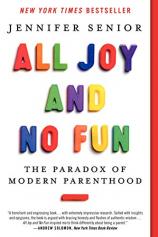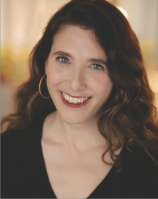Reading Group Guide
Discussion Questions
All Joy and No Fun: The Paradox of Modern Parenthood

1. Senior suggests that there are three developments that have changed and complicated modern parenting in America. First, control over when and how many children to have; second, how our work lives have become more complicated; and third, the transformation of the child’s role in home and society. Do you find these three issues present in your own household? How have you found ways to address these challenges in parenting?
2. In her chapter on marriage, Senior says men and women experience time differently. Women, she notes, feel like their time is divided and subdivided and their failure to get everything done in the amount of time they have is tied to their sense of self. Senior writes, “Being compelled to divide and subdivide your time doesn’t just compromise your productivity...It also creates a feeling of urgency --- a sense that no matter how tranquil the moment…there’s always a pot somewhere that’s about to boil over” (59). Do you find that this aligns with your role as a parent? Does this affect your relationship with your partner in the way Senior suggests?
3. Senior says that one of the most common fights among parents is the household division of labor. Is this true in your house? Did you arrange these divisions ahead of time or improvise as you went along?
4. In her chapter on adolescence, Senior suggests that having adolescent children around unmasks tensions that were previously concealed. Did you find this to be the case? If so, what? Did it start earlier than adolescence, even?
5. Senior suggests that one of the joys of having young children is re-engaging with the physical world --- doing things with your hands. Did this happen for you? What did you do? What pleasure does (or did) your young child allow you to do that you wouldn’t have done otherwise?
6. Senior observes that kids give adults a chance to practice philosophy again. What are some of the most baffling questions your children have asked you? How did you answer them? Did you find it a pleasure to answer those questions?
7. Do you think that the value of happiness is overemphasized in our culture, and we all might relax a little if we embraced the notions of duty and service instead?
8. What parts of parenting do you find hardest to talk about? What parts give you most pleasure?
9. As Senior profiles Angie and Clint’s daily challenges as modern parents, we see Clint declare: “I am the standard.” While Senior observes that fathers tend to judge themselves less harshly than mothers, and that they have fewer cultural and historical scripts to follow, she also remarks that mothers might have something to learn from fathers. Do you agree with this suggestion? How would you go about it?
10. In what ways does Senior’s description of joy mirror your own experience as a parent, and in what ways does it differ? Does Senior’s distinction between joy and fun capture your own reality as a parent? How so?
11. Sharon and Cam’s story becomes one of the book’s most poignant threads. How did Sharon’s unique perspective as both a parent and grandparent affect you?
12. In her chapter Concerted Cultivation, Senior speaks of the “overscheduled parent,” asking, “What, precisely, are we preparing our children for? How, as mothers and fathers, are we supposed to prepare them for it? Have parents always operated this blindly? Or were the roles of parents and children more clearly --- and simply --- defined in the past?” (123). Do you believe the “globalized future” has affected your choices as a parent? How so? How do you deal with these stressors in your family?
13. As a journalist, Senior pairs a great deal of research and complex social science with intimate stories of real families. Did you find this approach illuminating? Insightful? Relatable?
14. How do you think your “remembering self” will look back on the years of raising a toddler? A middle-schooler? An adolescent?
All Joy and No Fun: The Paradox of Modern Parenthood
- Publication Date: January 20, 2015
- Genres: Nonfiction, Parenting, Sociology
- Paperback: 336 pages
- Publisher: Ecco
- ISBN-10: 0062072242
- ISBN-13: 9780062072245








